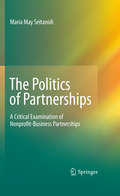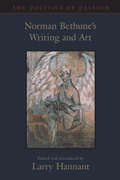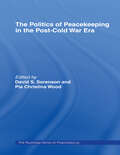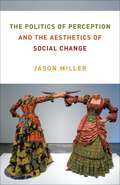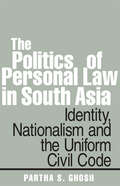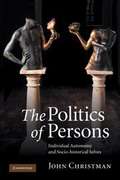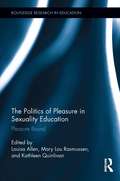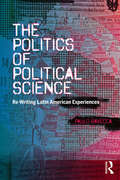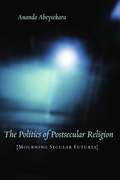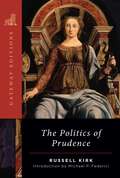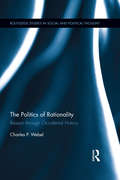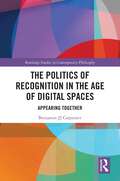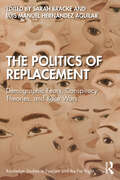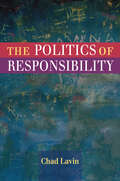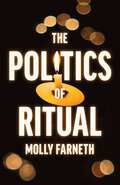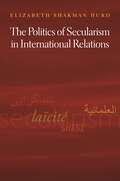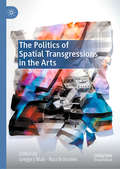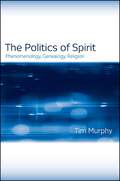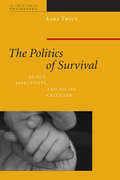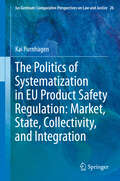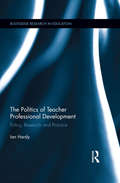- Table View
- List View
The Politics of Partnerships: A Critical Examination of Nonprofit-Business Partnerships
by Maria May SeitanidiThe widespread partnering phenomenon in the US and the UK spurred a significant amount of literature focusing on its strategic use. The Politics of Partnerships diverges by examining if partnerships can deliver benefits that extend beyond the organisational to the societal level resulting from the intentional combined efforts of the partners.
The Politics of Passion: Norman Bethune's Writing and Art
by Larry Hannant Norman BethuneThe Politics of Passion is the first comprehensive collection of the writing and art of Dr Norman Bethune. A Canadian medical pioneer and a communist, Bethune gained fame during the 1930s while serving in the Spanish Civil War and participating in China's struggle against Japanese invasion.This book sheds light on the man, the artist, and the revolutionary. It uncovers new historical material relating to several controversies surrounding Bethune. A remarkable document obtained from the Communist International Archives in Moscow, for instance, discusses why Bethune was sent home in disgrace from the Spanish Civil War. It refers to a mysterious Swedish woman, Kajsa von Rothman, who was Bethune's lover and who was believed by left-wing Spanish authorities to be politically suspect.This collection of Bethune's writings and art reveals that politics preoccupied him only during the last four years of his life. Earlier, his passionate nature found expression in medical and surgical innovation, as well as in painting, sketching, photography, writing - from poetry and short stories to letters, radio broadcasts, and plays - and public speaking. The Politics of Passion reveals the many sides of Bethune's identity, exploring not only the life of a revolutionary doctor, but of an intense and compassionate artist.
The Politics of Peacekeeping in the Post-Cold War Era (Cass Series On Peacekeeping Ser. #Vol. 17)
by David S. Sorenson Pia Christina WoodMost literature on peacekeeping narrowly focuses on particular peacekeeping operations, and the political bargaining between peacekeeping participants. However, there is very little published research on why nations actually commit forces to peacekeeping operations. This new book meets this need.The authors focus specifically on
The Politics of Perception and the Aesthetics of Social Change (Columbia Themes in Philosophy, Social Criticism, and the Arts)
by Jason MillerIn both politics and art in recent decades, there has been a dramatic shift in emphasis on representation of identity. Liberal ideals of universality and individuality have given way to a concern with the visibility and recognition of underrepresented groups. Modernist and postmodernist celebrations of disruption and subversion have been challenged by the view that representation is integral to social change. Despite this convergence, neither political nor aesthetic theory has given much attention to the increasingly central role of art in debates and struggles over cultural identity in the public sphere.Connecting Hegelian aesthetics with contemporary cultural politics, Jason Miller argues that both the aesthetic and political value of art are found in the reflexive self-awareness that artistic representation enables. The significance of art in modern life is that it shows us both the particular element in humanity as well as the human element in particularity. Just as Hegel asks us to acknowledge how different historical and cultural contexts produce radically different experiences of art, identity-based art calls on its audiences to situate themselves in relation to perspectives and experiences potentially quite remote—or even inaccessible—from their own. Miller offers a timely response to questions such as: How does contemporary art’s politics of perception contest liberal notions of deliberative politics? How does the cultural identity of the artist relate to the representations of cultural identity in their work? How do we understand and evaluate identity-based art aesthetically?Discussing a wide range of works of art and popular culture—from Antigone to Do the Right Thing and The Wire—this book develops a new conceptual framework for understanding the representation of cultural identity that affirms art’s capacity to effect social change.
The Politics of Personal Law in South Asia: Identity, Nationalism and the Uniform Civil Code
by Partha S. GhoshIt is a political study of the controversy surrounding the issue of the uniform civil code vis-à-vis personal laws from a South Asian perspective. At the centre of the debate is whether there should be a centralized view of the legal system in a given society or a decentralized view, both horizontally and vertically. This issue is entangled within the threads of identity politics, minority rights, women’s rights, national integration, global Islamic politics and universal human rights. Champions of each category view it through their own prisms, making the debate extremely complex, especially in politically and socially plural South Asia. So, this book attempts to harmonize the threads of the debate to provide a holistic political analysis.
The Politics of Persons: Individual Autonomy and Socio-historical Selves
by John ChristmanIt is both an ideal and an assumption of traditional conceptions of justice for liberal democracies that citizens are autonomous, self-governing persons. Yet standard accounts of the self and of self-government at work in such theories are hotly disputed and often roundly criticized in most of their guises. John Christman offers a sustained critical analysis of both the idea of the 'self' and of autonomy as these ideas function in political theory, offering interpretations of these ideas which avoid such disputes and withstand such criticisms. Christman's model of individual autonomy takes into account the socially constructed nature of persons and their complex cultural and social identities, and he shows how this model can provide a foundation for principles of justice for complex democracies marked by radical difference among citizens. His book will interest a wide range of readers in philosophy, politics, and the social sciences.
The Politics of Pleasure in Sexuality Education: Pleasure Bound (Routledge Research in Education)
by Louisa Allen Mary Lou Rasmussen Kathleen QuinlivanPleasure and desire have been important components of the vision for sexuality education for over 20 years. This book argues that there has been a lack of scrutiny over the political motivations that underpin research supportive of pleasure and desire within comprehensive sexuality education. In this volume, key researchers in the field consider how discourses related to pleasure and desire have been taken up internationally. They argue that sexuality education is clearly shaped by specific cultural and political contexts, and examine how these contexts have shaped the development of pleasure’s inclusion in such programs. Via such discussions, this volume incites a re-configuration of thought regarding sexuality education’s approach to pleasure and desire.
The Politics of Political Science: Re-Writing Latin American Experiences
by Paulo RaveccaIn this thought-provoking book, Paulo Ravecca presents a series of interlocking studies on the politics of political science in the Americas. Focusing mainly on the cases of Chile and Uruguay, Ravecca employs different strands of critical theory to challenge the mainstream narrative about the development of the discipline in the region, emphasizing its ideological aspects and demonstrating how the discipline itself has been shaped by power relations. Ravecca metaphorically charts the (non-linear) transit from “cold” to “warm” to “hot” intellectual temperatures to illustrate his—alternative—narrative. Beginning with a detailed quantitative study of three regional academic journals, moving to the analysis of the role of subjectivity (and political trauma) in academia and its discourse in relation to the dictatorships in Chile and Uruguay, and arriving finally at an intimate meditation on the experience of being a queer scholar in the Latin American academy of the 21st century, Ravecca guides his readers through differing explorations, languages, and methods. The Politics of Political Science: Re-Writing Latin American Experiences offers an essential reflection on both the relationship between knowledges and politics and the political and ethical role of the scholar today, demonstrating how the study of the politics of knowledge deepens our understanding of the politics of our times.
The Politics of Postsecular Religion: Mourning Secular Futures (Insurrections: Critical Studies in Religion, Politics, and Culture)
by Ananda AbeysekaraAnanda Abeysekara contends that democracy, along with its cherished secular norms, is founded on the idea of a promise deferred to the future. Rooted in democracy's messianic promise is the belief that religious-political identity-such as Buddhist, Hindu, Sinhalese, Christian, Muslim, or Tamil-can be critiqued, neutralized, improved, and changed, even while remaining inseparable from the genocide of the past. This facile belief, he argues, is precisely what distracts us from challenging the violence inherent in postcolonial political sovereignty. At the same time, we cannot simply dismiss the democratic concept, since it permeates so deeply through our modernist, capitalist, and humanist selves. In The Politics of Postsecular Religion, Abeysekara invites us to reconsider our ethical-political legacies, to look at them not as problems, but as aporias, in the Derridean sense-that is, as contradictions or impasses incapable of resolution. Disciplinary theorizing in religion and politics, he argues, is unable to identify the aporias of our postcolonial modernity. The aporetic legacies, which are like specters that cannot be wished away, demand a new kind of thinking. It is this thinking that Abeysekara calls mourning and un-inheriting. Un-inheriting is a way of meditating on history that both avoids the simple binary of remembering and forgetting and provides an original perspective on heritage, memory, and time. Abeysekara situates aporias in the settings and cultures of the United States, France, England, Sri Lanka, India, and Tibet. In presenting concrete examples of religion in public life, he questions the task of refashioning the aporetic premises of liberalism and secularism. Through close readings of Nietzsche, Heidegger, Arendt, Derrida, Butler, and Agamben, as well as Foucault, Asad, Chakrabarty, Balibar, and Zizek, he offers readers a way to think about the futures of postsecular politics that is both dynamic and creative.
The Politics of Protest in Hybrid Regimes
by Graeme B. RobertsonSince the end of the Cold War, more and more countries feature political regimes that are neither liberal democracies nor closed authoritarian systems. Most research on these hybrid regimes focuses on how elites manipulate elections to stay in office, but in places as diverse as Bolivia, Georgia, Kyrgyzstan, Serbia, Thailand, Ukraine, and Venezuela, protest in the streets has been at least as important as elections in bringing about political change. The Politics of Protest in Hybrid Regimes builds on previously unpublished data and extensive fieldwork in Russia to show how one high-profile hybrid regime manages political competition in the workplace and in the streets. More generally, the book develops a theory of how the nature of organizations in society, state strategies for mobilizing supporters, and elite competition shape political protest in hybrid regimes.
The Politics of Prudence
by Russell Kirk30th Anniversary Edition with a new introduction by Michael Federici.Conservatives are guided by prudence. So taught Russell Kirk (1918–1994), one of the founding fathers of American conservatism. If the tradition of prudential politics has fallen on hard times, its comeback might well begin in the pages of this wise book. An understanding of prudence as practical wisdom, the capacity of choosing the right means to attain worthy ends, is much needed in our time. It is the virtue most associated with the statesman. Distinguishing political prudence from ideology, Kirk examines ten principles, events, books, and thinkers that have shaped the conservative mind and heart. The final chapter examines the shortcomings of democracy throughout the world and the need for representative government conducted by temperate and thoughtful men and women. In an eloquent epilogue, Kirk calls the rising generation to the defense of order—both the moral order and the social order, the order of the soul and the order of society—against the enemies of justice, freedom, and a high culture. Reflecting decades of learning and practical experience, this lucid book is Kirk's bequest to the young men and women of today, an instruction manual for redeeming the time.
The Politics of Rationality: Reason through Occidental History (Routledge Studies in Social and Political Thought)
by Charles WebelWhat are reason and rationality? How significant are recent postmodernist and neuroscientific challenges to these longheld notions? Should we abandon a belief in reason and an adherence to rationality? Or can reason and rationality be reformulated and reframed? And what does politics have to do with how we think about reason and why we act more or less rationally? The Politics of Rationality differs from other books with "reason" or “rationality” due to its historical, political, depth-psychological, and multidisciplinary approach to understanding reason through history. Charles P. Webel eloquently clarifies the links among ideas, their creators, the relevant mental processes, and the political cultures within which such important concepts as reasons and rationality take hold. He demonstrates how reason and rationality/irrationality have become what they mean for us today and proposes a way to rethink reason and rationality in light of the withering critiques leveled against them. In doing so, he presents a "history of reason and rationality" by examining the intellectual and political contexts of four representative theorists of reason and rationality-- Plato, Machiavelli, Kant, and Weber—and by addressing contemporary challenges posed by postmodernism, depth psychology, and neurophilosophy.
The Politics of Recognition in the Age of Digital Spaces: Appearing Together (Routledge Studies in Contemporary Philosophy)
by Benjamin JJ CarpenterThis book provides a philosophical analysis of the notion of selfhood that underlies identity politics. It offers a unique theory of the self that combines previous scholarly work on recognition and the phenomenology of space. The politics of identity occupy the centre of a contested terrain. Marginalised and oppressed peoples continue to seek the transformation of our shared social world and our political institutions required for their lives to be liveable. Public criticism and academic treatments of identity politics often take a disparaging view that treats it as subordinate to more general political questions about justice and the organisation of society and its institutions. This book argues that these polemics ignore the numerous ways in which all politics is concerned with matters of selfhood and identity. Through a rereading of Hegel’s account of recognition as an ongoing and dynamic process that constitutes the self, it presents selves—and the categories of identity that qualify these selves—as fundamentally conditioned by the environments in which they appear before themselves and others. It also argues that we do the work of identity in public spaces—particularly digital spaces—and that these spaces shape what identities we can assume and what those identities mean. Contemporary social media technologies facilitate the production of particular forms of selfhood through the combined logics of the interface, the profile, and the post. The Politics of Recognition in the Age of Digital Spaces will be of interest to scholars and advanced students working in a wide range of disciplines including political philosophy, phenomenology, philosophy of technology, sociology, political theory, and critical theory. It will also appeal to anyone with an interest in contemporary identity politics, whether as a matter of study or lived experience.
The Politics of Replacement: Demographic Fears, Conspiracy Theories, and Race Wars (Routledge Studies in Fascism and the Far Right)
by Sarah Bracke Luis Manuel Hernández AguilarThe Politics of Replacement explores current demographic conspiracy theories and their entanglement with different forms of racism and exclusionary politics such as sexism. The book focuses on population replacement conspiracy theories, i.e. those imaginaries and discourses centered on the idea that the national population is under threat of being overtaken or even wiped out by those considered as “alien” to the nation, and that this is the result of concerted efforts by “elites”. Replacement conspiracy theories are on the rise again: from Eurabia fantasies to Renaud Camus’ The Great Replacement, white supremacist discourses are thriving and increasingly broadcasting in mainstream venues. To account for their rise and spread, this edited volume brings together research on various dimensions of population replacement conspiracy theories: different theoretical and methodological approaches, different social scientific and humanities (inter)disciplinary backgrounds, different geographical case-studies (across Europe, North America, Southeast Asia, and Oceania), different time-periods (medieval archives, colonial archives, Nazi archives, post-colonial migrations, post-9/11), and different forms of racialization and racisms (Islamophobia, antisemitism, racism against migrants and refugees), as well as with the entanglement of population replacement discourse with gendered violence. The book is organized into four sections: (1) exploring the historical background of the current rise of demographic conspiracy theories; (2) tracing the (neoliberal) governmentalities in and through which replacement discourse operates; (3) analysing the particularly intense focus on the threat of Muslims in contemporary replacement conspiracy theories, and (4) investigating the connection between replacement conspiracies, gender, and violence. This title is essential reading for scholars, journalists, and activists interested in the contemporary far right, conspiracy theories, and racisms.
The Politics of Representation in the Global Age
by Peter A. Hall Peter A. Hall Wade Jacoby Jonah Levy Sophie Meunier Wade Jacoby Jonah LevyHow has the process of political representation changed in the era of globalization? The representation of interests is at the heart of democracy, but how is it that some interests secure a strong voice, while others do not? While each person has multiple interests linked to different dimensions of his or her identity, much of the existing academic literature assumes that interests are given prior to politics by a person's socioeconomic, institutional, or cultural situation. This book mounts a radical challenge to this view, arguing that interests are actively forged through processes of politics. The book develops an analytic framework for understanding how representation takes place - based on processes of identification, mobilization, and adjudication - and explores how these processes have evolved over time. Through a wide variety of case studies, the chapters explore how actors identify their interests, mobilize them into action, and resolve conflicts among them.
The Politics of Responsibility
by Chad LavinPolitics cannot function without responsibility, but there have been serious disagreements about how responsibility is to be understood and huge controversies about how it is to be distributed, rewarded, legislated, and enforced. The liberal notions of personal responsibility that have dominated political thinking in the West for more than a century are rooted in the familiar territory of individual will and causal blame, but these theories have been assailed as no longer adequate to explain or address the political demands of a global social structure. Informed by Marx, Foucault, and Butler, Chad Lavin argues for a "postliberal" theory of responsibility, formulating responsibility as a process that is anchored in a persistent ability to respond, not reproach. Lavin works this formulation through discussions of contemporary political issues such as globalization, police brutality, and abortion. Rather than assigning individual blame, postliberal responsibility challenges the supposed autonomy of individual subjects by taking structural arguments into account. Lavin concludes that a liberal concept of responsibility gives rise to a moralistic and oppressive approach to social problems, while a postliberal approach highlights a shared responsibility for developing collective solutions to systemic problems. Postliberal responsibility not only suggests more generous and democratic responses to social ills, it also allows us to theorize a greater range of issues that demand political response.
The Politics of Ritual
by Molly FarnethAn illuminating look at the transformative role that rituals play in our political livesThe Politics of Ritual is a major new account of the political power of rituals. In this incisive and wide-ranging book, Molly Farneth argues that rituals are social practices in which people create, maintain, and transform themselves and their societies. Far from mere scripts or mechanical routines, rituals are dynamic activities bound up in processes of continuity and change. Emphasizing the significance of rituals in democratic engagement, Farneth shows how people adapt their rituals to redraw the boundaries of their communities, reallocate goods and power within them, and cultivate the habits of citizenship.Transforming our understanding of rituals and their vital role in the political conflicts and social movements of our time, The Politics of Ritual examines a broad range of rituals enacted to just and democratic ends, including border Eucharists, candlelight vigils, and rituals of mourning. This timely book makes a persuasive case for an innovative democratic ritual life that can enable people to create and sustain communities that are more just, inclusive, and participatory than those in which they find themselves.
The Politics of Secularism in International Relations (Princeton Studies in International History and Politics #105)
by Elizabeth Shakman HurdConflicts involving religion have returned to the forefront of international relations. And yet political scientists and policymakers have continued to assume that religion has long been privatized in the West. This secularist assumption ignores the contestation surrounding the category of the "secular" in international politics. The Politics of Secularism in International Relations shows why this thinking is flawed, and provides a powerful alternative. Elizabeth Shakman Hurd argues that secularist divisions between religion and politics are not fixed, as commonly assumed, but socially and historically constructed. Examining the philosophical and historical legacy of the secularist traditions that shape European and American approaches to global politics, she shows why this matters for contemporary international relations, and in particular for two critical relationships: the United States and Iran, and the European Union and Turkey. The Politics of Secularism in International Relations develops a new approach to religion and international relations that challenges realist, liberal, and constructivist assumptions that religion has been excluded from politics in the West. The first book to consider secularism as a form of political authority in its own right, it describes two forms of secularism and their far-reaching global consequences.
The Politics of Spatial Transgressions in the Arts
by Gregory Blair Noa BronsteinThis book is an anthology of the varied strategies of spatial transgressions and how they have been implemented through the arts as a means to resist, rejuvenate, reclaim, critique or cohabitate. The book is divided into two sections – Displacements and Disruptions. The first section discusses the ramifications of the spatial displacements of bodies, organizations, groups of people and ethnicities, and explores how artists, theorists and arts organizations have an attentive history of revealing and reacting to the displacement of peoples and how their presence or absence radically reconfigures the value, identity, and uses of place. In the second section, each author considers how aesthetic strategies have been utilized to disrupt expected spatial experiences and logic. Many of these strategies form radical alternative methodologies that include transgressions, geographies of resistance, and psychogeographies. These spatial performances of disruption set into motion a critical exchange between the subject, space and materiality, in which ideology and experience are both produced/spatialized and deconstructed/destabilized.
The Politics of Species
by Raymond Corbey Annette LanjouwThe assumption that humans are cognitively and morally superior to other animals is fundamental to social democracies and legal systems worldwide. It legitimises treating members of other animal species as inferior to humans. The last few decades have seen a growing awareness of this issue, as evidence continues to show that individuals of many other species have rich mental, emotional and social lives. Bringing together leading experts from a range of disciplines, this volume identifies the key barriers to a definition of moral respect that includes nonhuman animals. It sets out to increase concern, empathy and inclusiveness by developing strategies that can be used to protect other animals from exploitation in the wild and from suffering in captivity. The chapters link scientific data with normative and philosophical reflections, offering unique insight into controversial issues around the ethical, political and legal status of other species.
The Politics of Spirit: Phenomenology, Genealogy, Religion (SUNY series, Issues in the Study of Religion)
by Tim MurphyA penetrating critique of the dominant approach to the study of religion, The Politics of Spirit explores the historical and philosophical scaffolding of the phenomenology of religion. Although this approach purports to give a value-free, neutral description of religious data, it actually imposes a set of metaphysical and evaluative concepts on that data. A very harmful ethnocentrism has resulted, which plagues the academic study of religion to this day. Analysis of the history, core texts, and discursive structure of phenomenology of religion reveals how this ethnocentrism is embedded within its assumptions. Of particular interest is the revelation of the extent to which Hegel's ideas—over those of Husserl—contributed to the tenets that became standard in the study of religion.Tim Murphy argues that the poststructuralist concept of genealogy, as derived from Nietzsche, can both describe religion better than the phenomenological approach and avoid the political pitfalls of ethnocentrism by replacing its core categories with the categories of difference, contingency, and otherness. Ultimately, Murphy argues that postmodern genealogy should replace phenomenology as the paradigm for understanding both religion and the study of religion.
The Politics of Survival: Peirce, Affectivity, and Social Criticism (American Philosophy)
by Lara TroutHow can sincere, well-meaning people unintentionally perpetuate discrimination based on race, sex, sexuality, or other socio-political factors? To address this question, Lara Trout engages a neglected dimension of Charles S. Peirce's philosophy - human embodiment - in order to highlight the compatibility between Peirce's ideas and contemporary work in social criticism. This compatibility, which has been neglected in both Peircean and social criticism scholarship, emerges when the body is fore-grounded among the affective dimensions of Peirce's philosophy (including feeling, emotion, belief, doubt, instinct, and habit). Trout explains unintentional discrimination by situating Peircean affectivity within a post-Darwinian context, using the work of contemporary neuroscientist Antonio Damasio to facilitate this contextual move. Since children are vulnerable, naïve, and dependent upon their caretakers for survival, they must trust their caretaker's testimony about reality. This dependency, coupled with societal norms that reinforce historically dominant perspectives (such as being heterosexual, male, middle-class, and/or white), fosters the internalization of discriminatory habits that function non-consciously in adulthood. The Politics of Survival brings Peirce and social criticism into conversation. On the one hand, Peircean cognition, epistemology, phenomenology, and metaphysics dovetail with social critical insights into the inter-relationships among body and mind, emotion and reason, self and society. Moreover, Peirce's epistemological ideal of an infinitely inclusive community of inquiry into knowledge and reality implies a repudiation of exclusionary prejudice. On the other hand, work in feminism and race theory illustrates how the application of Peirce's infinitely inclusive communal ideal can be undermined by non-conscious habits of exclusion internalized in childhood by members belonging to historically dominant groups, such as the economically privileged, heterosexuals, men, and whites. Trout offers a Peircean response to this application problem that both acknowledges the "blind spots" of non-conscious discrimination and recommends a communally situated network of remedies including agapic love, critical common-sensism, scientific method, and self-control.
The Politics of Systematization in EU Product Safety Regulation: Market, State, Collectivity, and Integration
by Kai PurnhagenThis book examines the increasing role of the legal method of systematisation in European Union (EU) law. It argues that the legal method of systematisation that has been developed in a welfare-state context is increasingly used as a regulative tool to functionally integrate the market. The book uses the example of EU product regulation as a reference to illustrate the impact of systematisation on EU law. It draws conclusions from this phenomenon and redefines the current place and origin of systematisation in the EU legal system. It puts forward and demonstrates two main arguments. First, in certain sectors such as in EU product safety law, the quality of EU law changes from a sector-specific and reactive field of law to an increasingly coherent legal system at European level. Therefore, instead of punctual market intervention, it increasingly governs whole market areas. By doing so, it challenges and often fully replaces the respective welfare-based legal systems in the Member States for the benefit of the ideal of a market-driven EU legal system. Second, at European level, the ideal is in development. This illustrates the change of the function of Statecraft from nation-states to market-states.
The Politics of Teacher Professional Development: Policy, Research and Practice (Routledge Research in Education #80)
by Ian HardyThe Politics of Teacher Professional Development: Policy, Research and Practice provides innovative insights into teachers’ continuing development and learning in contemporary western contexts. Rather than providing a list of "how-tos" and "must dos," this volume is premised on the understanding that by learning more about the current conditions under which teachers and other educators work and learn, it is possible to understand, and consequently improve, the learning opportunities teachers experience. Teacher professional development is not simply construed as an isolated series of events, such as day-long workshops marking the beginning of each school year or term, or individualistic "one-off" activities focused on new teaching approaches, curricula or assessment strategies. Rather, through application of sociologist Pierre Bourdieu’s understanding of social practices as contested, teacher professional development is revealed as a complex social practice which exists as policy, as a research product and process, and as an important part of teachers’ work. The book reveals how PD as policy, research and teachers’ work are inherently contested. An extended series of case studies of teacher professional development practices from Canada, England and Australia are employed to show how these tensions play out in complex ways in policy and practice.
The Politics of Technological Progress: Parties, Time Horizons and Long-term Economic Development
by Joel W. Simmons"Why are some countries richer than others and why do some economies grow more rapidly? The Politics of Technological Progress answers these vital questions by highlighting the importance of technological progress for sustained economic development. The author also explains why some countries exhibit faster technological progress than others. Armed with a wealth of cross-national empirical evidence, Professor Simmons stresses the importance of properly constructed political parties for establishing an environment conducive to technological progress. 'Well-institutionalized' ruling parties are essential for technological progress, he argues, because only in such parties are time horizons long enough for governments to accept the deferred returns that are an inherent feature of government efforts to encourage innovation and technology adoption in the economy"--
